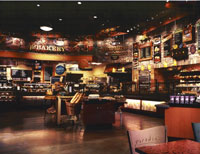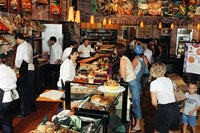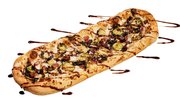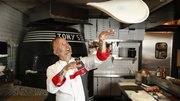Article
Fast-casual franchising: Is your chain ready?
You don't want to franchise too quickly. Most experts say to wait at least five years before announcing franchising plans.

October 23, 2006
Fast-casual restaurant owners should be cautious when taking the franchise leap. Experts say knowing when to franchise your concept could be the difference between positive profit margins and angry investors.
Thom Crimans, president of FranNet MidAmerica, sees many restaurateurs franchising too quickly. He said some operators get excited because their customers often praise their great menus and then ask about franchise opportunities.
"But their (customers) attitude changes when it comes time to write a check," Crimans said. "It's very easy for me to walk into a place and say, 'Wow this is really good. I wish I had one in my town.' It's another thing for me to plunk down two, three, four or 500,000 dollars and commit two years of my life to getting it started."
| |||||||||||||||
Bruegger's Bagels is a fast casual that shot out of the franchising gate too fast and eventually faltered, said
"We had a number of competitors. Some of them were publicly financed," Greco said. "All of them — including us — were looking to grow as fast as they could."
Within 18 months of franchising its concept, Bruegger's grew from 50 units into a 155-unit chain with stores in 16 states. System-wide, it earned $81 million in sales in 1994, ranking as the largest bagel chain in the nation.
"We intend to dominate every market we enter," said former CEO Stephan Finn in a July 17, 1995, interview with Nation's Restaurant News.
But Greco said this grow-fast attitude resulted in poor site selection for new stores and attracted inexperienced franchise operators. The result was the closure of 200 stores from 1995-2001. Since then, Greco and company have turned the chain around. The company has reported 10 consecutive quarters of comparable same-store sales increases.
Prove yourself
Paradise Bakery & Café founder Dan Patterson said operators often franchise too quickly because they want to make money and don't really care about the quality of the product. He believes a restaurant concept should prove itself sound for at least three years before franchising.
That's about the timeline Tossed is following. Founded in 1997, the salad-focused company decided to franchise about two years ago and recently made its plans public. Although Tossed officials have systemized all the menu items and perfected a store model, they took their time before selling agreements.
"We could have started selling franchises two years ago and made a lot of mistakes," said Tossed president and CEO Eric Schmitt, who worked as a consultant to help franchise Atlanta Bread Company and Marco's Pizza. "We have spent two years researching and simplifying our processes and defined what we believe is the right real estate."
  |
Paradise Bakery Café waited two decades before aggressively seeking new franchise owners. And the chain is doing just fine. |
Franchise attorney Jeff Letwin consults with companies that are at the "Are we ready to franchise?" stage. For fast casuals, he believes everything from menu-item ingredients to store design to advertising budgets should be solidified before announcing franchising plans.
"You shouldn't franchise unless you've tested a model store for at least a year," Letwin said. "If you can't prove that your systems have worked, you won't attract good owners."
Patterson looks at it from the operator's perspective. "It's one thing to answer problems at a company store; it's another ballgame with franchise stores. That's why every little detail about how to run the store must be documented and proven."
In addition to having an efficient plan, Patterson believes setting growth goals is essential at the beginning. He cautions restaurateurs not to over-hype their plans, such as announcing they will open 1,000 stores in 10 years.
"You can certainly get more exposure by franchising and gain more financially, but if you cannot maintain the growth, you can hurt your brand," Patterson said. "In fast casual, some concepts make enormous announcements of how many stores they're going to open. But history tells us that they won't work."
Perfecting the UFOC
Perhaps the most-important step in starting a franchise is solidifying the Uniform Franchise Offering Circular (UFOC) and the Franchise Agreement, Letwin said.
This disclosure document consists of 23 categories that must be provided to the prospective franchisee at least 10 business days prior to the execution of the agreement. Fees, litigation track record and financial statements are among the items that must be covered in the document. If the UFOC is not followed and the franchisee files a complaint, the Federal Trade Commission (FTC) can issue fines of up to $100,000.
"The rules are pretty clear," Letwin said. "It's too high a risk to try to undertake the UFOC; it's best to hire a lawyer and do it right."
In addition, a new franchisor should secure all the rights to the intellectual property associated with menu items and brand names. Letwin said, "You don't want to have to end up paying royalties to somebody who uses a name similar to yours." When he worked for a fresh-Mex restaurant called Zuma, he learned the name was already claimed. "So we named it Qdoba."
This article originally appeared in Fast Casual magazine
 ChatGPT
ChatGPT Grok
Grok Perplexity
Perplexity Claude
Claude













